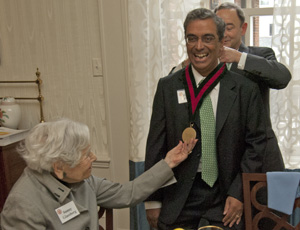In 2007, Washington University Chancellor Mark S. Wrighton introduced an initiative called the International Center for Advanced Renewable Energy and Sustainability, known as I-CARES, to encourage and coordinate collaborative research in the areas of renewable energy and sustainability.
Today, the I-CARES initiative is thriving, in no small part due to the leadership of Himadri B. Pakrasi, PhD, its director and professor of energy with a dual appointment in Arts & Sciences and in the School of Engineering & Applied Science, as well as the generosity of Sonya “Sunny” Glassberg. In 2009, Glassberg made a $2 million commitment to Washington University establishing an endowed professorship for the directorship of I-CARES, on behalf of the Glassberg family.

At the event, Wrighton noted the Glassberg family’s long list of Washington University alumni and thanked them for their longtime support of the university and to the School of Engineering & Applied Science, where the I-CARES operation resides.
“We are grateful to Sunny Glassberg and the Glassberg family for supporting our research in the critical area of energy sustainability and emissions reduction,” Wrighton says. “Your great generosity over the years has helped us move our mission forward.”
In addition to the professorship, the endowment will fund the Albert P. and Blanche Y. Greensfelder Forum, which will bring visiting scholars to campus periodically.
Pakrasi is a leading biochemical educator and researcher whose experience crosses the boundaries of the biological and physical sciences, a key element in forging groundbreaking approaches to the global energy crisis.
A native of Calcutta, India, Pakrasi earned undergraduate and graduate degrees in physics at the Presidency College and the University of Calcutta, then continued his education in the United States. Here, he earned a master’s degree in biophysics from the University of Rochester, and a doctorate in 1984 from the University of Missouri-Columbia. Three years later, he joined the WUSTL faculty.
“Himadri Pakrasi is a renowned scientist who has distinguished himself as a pioneering researcher in bioenergy, quantitative biology, photosynthesis, membrane biology, redox processes and genomics,” says Gary S. Wihl, PhD, dean of the faculty of Arts & Sciences and the Hortense and Tobias Lewin Distinguished Professor in the Humanities. Wihl was a featured speaker at the installation ceremony.
“As the approaches to understanding the physical world become increasingly multidisciplinary and complex, a person with Himadri’s ability to transcend boundaries and create connections will be essential to the advancement of important discoveries,” Wihl says.
Pakrasi’s work has been published extensively, and he has served on the editorial boards of many scholarly journals. As a member of the university’s McDonnell International Scholars Academy, he also serves as ambassador to Jawaharlal Nehru University in New Delhi. In addition, he is an elected fellow of the American Association for the Advancement of Science, the American Society for Microbiology and the American Society of Plant Biologists.
The Glassberg family’s relationship with Washington University spans a century, beginning in 1901 when Myron Glassberg’s uncle, Albert P. Greensfelder, earned an undergraduate degree. Greensfelder’s wife, Blanche, earned a master’s degree in 1927, the same year that Sunny Glassberg’s husband, Myron, graduated with an engineering degree.
Two of the Glassberg’s children are alumni: Sally Glassberg Sands, PhD, who earned an undergraduate and two master’s degrees; and Tom Albert Glassberg, who received a law degree in 1987. Grandchild Adam is the most recent member of the Glassberg family alumni, graduating in 2009.
In naming the professorship, Sunny Glassberg also honors her husband’s aunt and uncle, Blanche and Albert P. Greensfelder.
Myron Glassberg founded the General Installation Co., and served as its chairman and chief executive officer from 1972-1980. But running a successful business did not keep him from enjoying the outdoors, a passion he shared with Albert, an ardent conservationist.
During their lifetimes, both men gave generously to organizations that restored and protected outdoor recreational spaces.
After her husband’s death in 1991, Sunny Glassberg carried on his work by supporting some of St. Louis’ most iconic outdoor spaces: Turtle Park, the Glassberg Shelter at Greensfelder Park, the World’s Fair Pavilion in Forest Park, the reforestation in Tower Grove Park, the Pavilions at Shaw Nature Reserve, and a garden gracing the entrance to the St. Louis Holocaust Museum.
At a young age, Sunny Glassberg discovered the importance of giving from her father, and has helped maintain a vibrant region by supporting many of St. Louis’ educational, civic and cultural institutions. An inner directive guides her giving philosophy, and honors her husband with every gift because, in her words, “he made my philanthropy possible.”
In 2007, she was named a St. Louis Woman of Achievement for her creative philanthropy, just one of many awards and honors that acknowledge her great contributions, most notably providing scholarships for local students, and partnering with the Missouri Department of Conservation to donate 438 acres of wilderness on the Meramec River for public use.
“Through the work of I-CARES, Sunny Glassberg’s lifelong dedication to helping the local community takes a leap forward and extends the meaning of community throughout the globe,” Wrighton says. “Thanks to the philanthropic foresight of Sunny Glassberg, the Glassberg family gift to Washington University will benefit multitudes in the future while honoring loved ones past and present.”